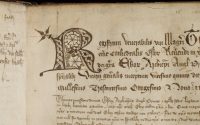What’s on : Lectures
Event Information
Time Travel for Beginners: the new and old worlds of archives
Gary Brannan, Keeper of Archives and Special Collections, Borthwick Institute for Archives
The Borthwick Institute for Archives at the University of York provides a rich vein of raw material for research, curiosity and discovery, deepening our understanding of the world around us and quenching our curiosity to know more. No two days are ever the same. Whether it’s a creative theatre company turning a fourteenth century Archbishop’s Register written in Latin into a bawdy morality play for the London stage featuring a runaway nun, or a high tech analysis of the DNA of parchment, the gems stored inside the archives never cease to amaze. But what are archives for, in this post-pandemic age? How does archive research happen – and what are the possibilities? And, in a post-truth age – why does archival truth matter?
The Yorkshire Philosophical Society’s AGM will take place at 7pm and this talk will follow afterwards. Held on Zoom an invitation will be sent to everyone on the YPS email list.
Member’s report
The 2021 YPS AGM was followed by the lecture on archives – on the face of it, not the most dynamic of subjects but in Gary Brannan’s enthusiastic presentation that is what they became. As Keeper of Archives and Special Collections at the Borthwick Institute for Archives, his remit is broad, taking in rare books, the University of York art collection and York Minster archives, and can lead to unexpected discoveries. An early example of this was the story of Joan of Leeds contained in the 14th-century register of Archbishop Melton. This documented a scandalous account of a nun who escaped to Beverley for a life of carnal lust, having faked her own death. Her story was taken up in December 2019 by the New Diorama Theatre in London, reviewed under the heading ‘Randy lesbian nun runs wild’.
The lecture fell into three sections – past, present and future. The Borthwick Institute, founded in 1953 grew out of a general move to put York in the centre of scholarship. Luminaries including Oliver Sheldon, J. B. Morrell, Eric Milner-White and Canon Purvis shared a growing concern that York should be seen as a centre of excellence and the establishment of a significant archive was an essential part. A major part of its first intake was the diocesan archive, which in turn has led to acquisitions of much genealogical material. In 2005, the Institute moved from St Anthony’s Hall to the Morrell library at the University of York.
The Borthwick Archive continues to support and expand the university’s cultural endeavour and contribution to human understanding through collecting and preserving archives in the quest to stimulate and facilitate human curiosity. It has needed to evolve according to the needs of their users, with increased audio digitisation and the forging of new partnerships, for example with Find my Past, a source for searching English genealogical records. A particular challenge has been with Covid-19, which has vastly restricted personal access, though online access has expanded – the archives have never been busier. Brannan also emphasised the importance of preserving lies as well as truths and not to shy away from archiving documents containing uncomfortable truths, such as involvement in slavery.
Looking to the future, Brannan saw a ‘multiverse of possibilities’, with access to archives a right and not a privilege and with more voices from the wider community and not just those in authority. Researchers already expect records kept to be as full as possible and this trend is expected to increase. Digitisation would no doubt continue, but how realistic is it to digitise everything and what would the individual researcher miss by not coming face to face with the original?
A highlight of the lecture was to use a second camera which allowed YPS members to view the Society’s first Minute Book of 5 March 1823, a 1911 pamphlet on the proposed new lecture theatre, a log of scientific discoveries and the autograph book of royal visitors from Queen Victoria to Charles, Prince of Wales. The final signature was, exceptionally, that of David Attenborough, considered eminently worthy to be included on his visit to the Jurassic exhibition, not royalty but a ‘national treasure’.
Dorothy Nott

